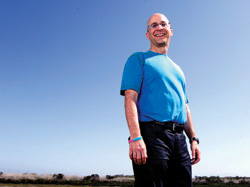These venture capitalists skip law firms for legal services startups

Jason Mendelson is the Foundry Group co-founder and one of four managing directors. He hails from Boulder, Colo., and his JD is from the University of Michigan. Photo by Matt Nager.
Venture capitalist Jason Mendelson, in a speech he gave last year, was not venturing much oral capital into the concept of investing in legal services.
A corporate and securities-law attorney before he co-founded the Foundry Group, his venture capital firm, Mendelson told a conference he found it difficult to invest in companies serving law firms because, unlike regular enterprise customers, they don’t always act rationally when it comes to economics. He warned that most legal startups would fail due to the industry’s complications and barriers.
Next up to speak was Colin Rule, the founder and chief operating officer at Modria, which bills itself online as “the world’s leading online dispute resolution experts.” And things changed.
Mendelson says he was so impressed by Rule and by Modria’s emphasis in targeting an area of the law that wasn’t regulated by the ABA Model Rules of Professional Conduct or serviced by traditional law firms that he immediately agreed to a meeting and made an investment shortly afterward.
“We made a love connection at that conference,” Mendelson says.
Rule is just as starry-eyed.
“We’ve spent a lot of time talking to VCs, and a lot of the time they don’t understand the law profession,” Rule says. “That’s a big challenge. Occasionally around the table at a VC meeting there’s a lawyer, and when you talk about the challenges the legal profession is facing, they get it. Jason got it.”
Editor’s Note: Three years ago, the ABA Journal began a series of reports on the paradigm shift in how law is being practiced. Noting the changes brought on by a maturing market, disruptive technology, economic recession and the rise of legal services competing with law firms for parts of the legal dollar, this series has looked at how the legal business is responding—and the legal profession often not responding—to pressures never before placed on lawyers and law firms.
This article is the fifth in our magazine series. It is a look at the venture capitalists who are financing legal services, but not law firms, to both increase access to justice and make money—lots of it. They are redefining what lawyers do, and helping shift the paradigm of law practice today. There is also online-only content for the series, available here.
Paradigm Shift Feature Stories
October 2013
Who’s eating law firms’ lunch?
July 2012
The Pedigree Problem: Are law school ties choking the profession?
January 2012
The Law School Bubble: How long will it last if law grads can’t pay bills?
March 2011
What America’s Lawyers Earn
CASH FOR LAW, NOT FIRMS
It’s no secret that investment money is flowing into law. In February, an article on the website of Tech Cocktail, a media company covering startups, crowed that “roughly $458 million was invested into legal startups in the last year by investors. This is a remarkable increase from the $66 million invested in 2012. And 2014 began with a strong January, seeing almost $12 million done in four deals. Awareness and confidence in the legal startup arena is growing.”
But that money is not going to law firms. Venture capitalists are skeptical of the upheaval underway in BigLaw, with uncertainty around changes in pricing and ownership rules as well as concern about efficiency and access to justice. So instead, VCs are investing in the legal technology vendors that are filling in some of those holes.
Lex Machina, Modria, Ravel, Rocket Lawyer, LegalZoom, SIPX (the Stanford Intellectual Property Exchange) and more—all have been the beneficiaries of this new outreach from venture capital as they seek to compete with or complement major law firms.
The fact that VCs are interested in this budding segment of the legal industry—and that they only invest in enterprises they expect will make money for them—suggests a trend is taking shape that’s here to stay and likely to lead to good results.
“These people don’t invest money to lose,” Mendelson says of his fellow venture capitalists. The flow of funds was slow to get started, however, in part because of an aversion to the law. “There are very few lawyers who become startup investors, and those who do typically shun legal startups,” says VC Clint Korver, who founded Ulu Ventures in 2009 in Palo Alto, Calif., with his wife, Miriam Rivera, former vice president and deputy general counsel at Google.
That’s why Rule says he tries to keep the law out of his pitches to investors. Since Modria is an online dispute resolution and mediation platform based in San Jose, Calif., Rule talks instead about the problem and about the value disputes that aren’t currently addressed in the legal model.
“Where there’s a huge unmet need, a company can emerge with a solution and grow quickly,” Rule says. “That’s what gets investors excited.”
But the separation between law and venture capitalists is melting away. The current chair of the National Venture Capital Association is Josh Green, a former Silicon Valley attorney. And Peter Thiel, co-founder of PayPal, has a law degree from Stanford and has helped fund a few legal tech companies, including the legal research startup Judicata.
In fact, this new investment interest has been led largely by venture capitalists with legal backgrounds. Another investor with a law degree is Ron Dolin, who worked at CERN, the European Council for Nuclear Research in Geneva, before getting a PhD in computer science and becoming one of the first 100 employees at Google. He left after six years to pursue a JD and now teaches legal technology and informatics at Stanford Law School.
He’s also an angel investor with a focus on legal technology startups and says he wants to start a whole pipeline of them to whittle away at the inefficiencies in the industry.

Pictured from left to right, Venture Capitalists Robert Siegel, Jeff Thermond, Miriam Rivera, Clint Korver, Ron Dolin, and Josh Becker. Photo by Norbert von der Groeben.

Ron Dolin is an Angel investor and Stanford Law School research fellow from Stanford, Calif., with a JD from the University of California’s Hastings College of the Law. Photo by Norbert von der Groeben.
ANGEL OR VC?
The difference between angel investors like Dolin and big-money venture capitalists like Mendelson isn’t clear-cut anymore, Dolin says. “It’s now kind of a continuum,” he says. “Typically, angels put in $10,000 to $100,000. But VCs are putting in seed money because they want to gain early entry into a company. And angels are putting in half a million now, so it’s getting a little more mushy.”
The basic need, regardless of the stated motivation, is to take tens of millions of dollars and turn that into hundreds of millions. And venture capitalists are hungry for more ideas that will get them there.
“When you’re working on something like legal aid, that’s not likely to lead to for-profit startups,” Dolin says. “But in consumer law, there’s plenty of room for startups there. And when you start talking about consumer law, now you’re looking at interest among VC people. You’re going from Saks Fifth Avenue to something like Wal-Mart or Sears.”
The latent market for the legal needs of the middle class is tens of billions of dollars a year, Dolin says, as long as the right services and the right pricing structure are developed.
“It’s like H&R Block—where’s the legal equivalent of that?” Dolin says. “When you start talking consumer law, you get that increase in scale and ramp-up of a startup. If they hit the market right, that’s what a VC is looking for,” he says. “The ones that don’t fail have to pay for the ones that do fail, so they’re looking for high-end growth.”
But returns aren’t all that drive VCs.
“Yes, there’s making money, but a lot of it is enabling dreams and pursuing causes,” says Dolin. “I’m wanting to invest in legal tech because I want legal technology to succeed. It’s incredibly important with consumer law. “The latent market is a signal of inefficiency—of people not getting the help they need because the infrastructure is broken. The fact that someone’s making money is indicative of an inefficiency being fixed. “It’s not selling Pet Rocks,” he says. “I don’t want to sell Pet Rocks. I want to have an impact in a field that is really important for humanity. And the fact there are such inefficiencies also means there’s a lot of money to be made.”
Dolin says he often co-invests with Ulu Ventures’ Rivera, whom he knows from their time together at Google.
“Miriam will contact me when she has a legal tech company because she likes having me onboard, and she feels it helps them be more successful because of my engineering and law background,” Dolin says.
Rivera shares Dolin’s drive, he says.
“Miriam cares about women in law, minorities, access to legal justice, making money. All these various interests align, and where you see such huge inefficiencies as you do in the legal industry, you can simultaneously help people and make money—and that’s the best,” Dolin says. “You don’t have to decide between making money and helping people.”
Korver, Rivera’s husband and now chief operating officer of NovoEd—an online, college-level education provider—agrees with Dolin’s assessment: “We have financial criteria for our investments, but we’re also looking to make the world a better place,” he says.

Miriam Rivera is Ulu Ventures’ co-founder and managing partner in Palo Alto, Calif., who received her JD/MBA from Stanford University. Photo by Norbert von der Groeben.
HER STORY
Rivera, one of the most influential women in Silicon Valley, got her start as a venture capitalist “half by accident and half intentionally,” given her background with the law and Google, Korver says. Rivera says she’s “one of the crazy people who actually loved practicing —a glutton for punishment—the intellectual challenge of law tied to core values of justice and fairness.”
That’s what also makes the legal industry attractive to her as an investor, she says, although she knows all too well that the complexity and inefficiency can be barriers to entry for investors.
“Perhaps a knowledge of the law makes you aware of how conservative a profession it is and how slow to adapt, so it makes you more cautious,” Rivera says. “But at some level there are new and interesting opportunities.”
Rivera’s business background enhanced her value as an attorney, she says, helping her bring a more quantitative and data-driven approach to the practice and operation of law. But as Google’s vice president and deputy general counsel, she found herself looking at metrics and running law departments in a way that was novel in the field of law, where most participants don’t have backgrounds in business or operations.
Google was going through a high-growth phase, and she had a hard time figuring out how to resolve matters in compliance with the law while still meeting metrics such as closing advertising partnerships in three days. Going too slowly could have stalled revenue growth and hurt the company’s future.
So Rivera looked to find “ways people could do legal tasks with as little legal intervention as possible.” That started the company on the hunt for technology that could automate some of these legal solutions.
In addition, since Google was a very data-driven company, the founders and then-CEO Eric Schmidt wanted to understand the tradeoffs between legal protections and business needs in financial terms. It was difficult for Rivera to provide the executives with data on risks of commercial litigation or contract work.
“It was so frustrating trying to be a data-driven legal department when the whole profession doesn’t even support the use of data—because it’s fine to reinvent the wheel if you get paid every time you re-create the wheel,” Rivera says.
And that’s why Lex Machina, a legal analytics company based in Menlo Park, Calif., sparked her interest.
Lex Machina offers the tools to assess and compare law firms’ and lawyers’ work and outcomes, assuaging the frustration Rivera still carried from when she was building Google’s legal department from two to 150 attorneys, but had no way of evaluating the counsel she paid, says Josh Becker, Lex Machina’s CEO.
For Korver, who has a PhD in management science and engineering from Stanford, what resonated was the company’s focus on making better decisions through legal analytics, Becker says.
Korver was the first to see that Lex Machina wasn’t competing against traditional legal providers, but instead was providing a new capability—combining a lawyer’s intuition with hard data to make the best decisions, Becker says.
“There is a cool factor,” Rivera says. “It’s a lot of fun to be a part of. When I look at a company and imagine the future of law and how it will be different, I can see the impact.”
Ulu Ventures has gone on to help fund such legal startups as Hire an Esquire (flexible law-firm staffing); Ravel (legal research); SIPX (copyright management); and EasyESI (document storage and review).
“Once you make an investment in an area, particularly in one that’s somewhat tricky for general VCs to understand, you become someone people know to go to,” Rivera says. “You understand what they are trying to do and that there really is a market potential here. People not familiar with law often underestimate how big an industry it really is.”

Lex Machina CEO, Josh Becker, hails from Menlo Park, Calif., and has a JD/MBA from Stanford University. Photo by Norbert von der Groeben.
POSTER CHILD
Lex Machina is one poster child for this new investing development.
“When I started in 2011—we raised our first round in the beginning of 2012—you had very few venture capitalists that had ever invested in the legal space,” says Becker, who was once a venture capitalist himself. “It was very much an area that wasn’t on the radar screen with VCs. There was a lot of skepticism.”
Becker says he used his relationships and credibility with investors to get venture capitalists to take a look at the merits of Lex Machina and not just dismiss it out of hand because it was law-related. “Once we did that, we were able to attract investment,” Becker says. “And we helped pave the way for a lot of companies because once one VC goes into a space, others look at it.”
Indeed, the number of legal companies seeking funds through AngelList, a website that helps connect startups with investors, has surged from only a few three years ago to 461 as of press time. A venture-capitalist firm’s entry into one company in an industry not only attracts others; it also can make that firm comfortable enough for further forays in that field. One of Lex Machina’s investors, XSeed Capital, went on to help fund SIPX.
XSeed, based in Portola Valley, Calif., was founded in 2006 to invest in companies that have tech as a key differentiator, says Robert Siegel, a general partner at the firm. The partnership makes its initial investments at the seed stage and works with management when a startup is raw but has “the ability to become humongous,” Siegel says.
“We are backed by institutional investors looking for high risk and high reward,” he says. “We’re looking to fund the next Google.”

Robert Siegel, from Portola Valley, Calif., is a general partner at XSeed Capital with an MBA from Stanford University. Photo by Norbert von der Groeben.
XSeed is small, managing just $110 million, making it part of a new wave of micro venture capitalists who focus on the seed stage of a startup, Siegel says. That often requires a close relationship with universities, which is where the core of money for technology gets invested, he says.
XSeed looks closely at risks in a startup’s technology, execution and market, Siegel says. The company likes technology risk because, if technology is a differentiator, good engineers can solve most problems. If there’s execution risk, then XSeed considers whether it can help the firm hire the right skill set, Siegel says, similar to being the coach of a sports team.
Market risk—“Will the dogs eat the dog food?”—is the variable that’s hated by most VCs, who don’t like the uncertainty of knowing whether customers are going to buy a product or not, he says.
“We look at the law profession as but one potential vertical that has the ability to be reinvented,” Siegel says. “I’d be lying if I said that we looked at 20 verticals and law was the only one we chose. But when we looked, there were attributes that made us believe there would be certain opportunities here. It’s a large market with slow incumbents, old technology and new technology being developed that can deliver better solutions that are available today.”
Hence XSeed’s investment in Lex Machina, which came out of Siegel’s alma mater, Stanford, where he’s now on the faculty. He had known Becker at Lex Machina for the last 15 years, and when Becker was looking to raise money for his startup, “people advised Josh to go talk to Rob, because the guys at XSeed like funding companies with deep tech breakthroughs out of universities,” Siegel says.

Clint Korver is NovoEd’s COO and Ulu Ventures’ co-founder. His PhD is in management science and engineering from Stanford University, and he now resides in Palo Alto, Calif. Photo by Norbert von der Groeben.
THE STANFORD INCUBATOR
Stanford Law has been an incubator for legal startups, being situated in the heart of Silicon Valley and hosting its swarm of entrepreneurial activity.
In fact, Korver and Rivera, whose JD/MBA is from Stanford and who recently served on its board of trustees, say Ulu Ventures focuses on tech coming out of the school. Korver teaches entrepreneurship there, too, and the pair co-founded a group called Stanford Angels & Entrepreneurs to connect alumni seeking startup assistance with those offering funds.
The VC firm subleases space from a law firm on Stanford land in a building whose red-tile roofs match the university’s.
“We’ll take a meeting with any company coming through CodeX,” the Stanford Center for Legal Informatics, Korver said in an interview before stepping back from Ulu Ventures to join one of its companies.
Silicon Valley has the right ingredients for the new developments in the legal industry, with the confluence of a law school, design school, startup mentality, venture capitalists, banks and law firms. And most have made sure they’re close enough to be within biking distance of Stanford, since so many entrepreneurs don’t have cars, Rivera says.
“The machinery, the culture, the mindset is such that when it gets going, it’s going to kick ass,” Dolin says of the valley. “So all of a sudden we realized, ‘Hey, we could apply this innovative machinery to the legal system, so let’s do that.’ “
And the ecosystem does make a difference. Many of the entrepreneurs already knew the investors they ended up working with through friends or their kids’ sports teams.
“It’s a small valley,” Becker says.
But Silicon Valley isn’t the only hotbed for legal startups.
“Relatively speaking, there’s been quite a lot that has come out of Stanford, but if you go to these legal tech dinners, it’s not like the majority of them are from Stanford,” Dolin says. “Legal tech is coming from all over the place.”
Still, Lex Machina’s Stanford connection was what got the company its first meeting with XSeed, which is closely associated with the school. One of XSeed’s investment theses is that technology is enabling the analysis of data better than at any other time in history, says Jeff Thermond, a venture partner with the firm. And Lex Machina fit with that. It just happened to be in the legal space.
“I don’t think we went out and said, ‘Let’s go light up the legal services space because we think it’s the natural area for VC investing,’ ” Thermond says. “From the outside, people think venture capitalists tend to invest in categories. In reality, the investments are about companies, and they’re very specific.”
Thermond worked in information technology and computer networking for 30 years before joining XSeed as a venture partner. He doesn’t have legal training, but when he was an executive at Broadcom, the company “got involved in a bunch of lawsuits, and he got involved, so he had personal experience,” Becker says. So when XSeed invested in Lex Machina, Thermond “just got it right away and joined the board to be a mentor to me.”
Venture capitalists rarely have time to get out and search for something in a certain space, Thermond says. Mostly they just evaluate the pitches coming in and decide whether one fits their view of the world, whether they like the team, whether the market is big enough to produce a venture-size return and whether the technology is there.
“The law is a very appealing space to us because whereas retailers for 20 years have been doing things with fancy databases to analyze consumers, the law has been a laggard in adopting technology like this,” Thermond says. “We think there’ll be a very high payoff.”
And the herd mentality is strong.
“If someone is really successful in a given area, everyone will jump on the bandwagon,” says Rivera.

Colin Rule is the founder and COO at Modria based in San Jose, Calif. Photo by Norbert von der Groeben.
GROWING CLOSER
Venture capitalists’ partnership with legal companies is maturing. Becker says that for his first round of funding, he had to run around and pitch to a lot of firms. But for a recent round, last May, “they really sought us out and found us,” he says. The company raised $4.8 million in a Series A funding round led by Cue Ball Capital in Boston. (Series A is the first major venture funding round after the seed capital.)
Cue Ball has a more traditional venture-capitalist approach and didn’t invest in Lex Machina out of a love for law, Thermond says. Instead, the company sees “a large market that’s missing something, a lot of technology out here, a proven team—and it doesn’t look like a firm that will require a ton of money put into it, so it should be a good return,” Thermond says.
That’s a big change from two or three years ago, when most VCs weren’t open to even contemplating a company in the legal industry, Becker says.
“It still has to be a solid plan, but at least now VCs are open to looking at you,” he says. “It’s pretty hot. There’s a lot going on. It’s really exciting.”
And all of the newly available financial backing is in turn inspiring new startups.
“There are a lot of very entrepreneurial lawyers. And once they see there’s capital out there, if they’ve got ideas—that’s spurring interest,” Becker says.
To be sure, one foray into the field doesn’t necessarily lead to an entire settlement. And the industry’s growth path is still bumpy, with only a handful of companies—such as online document and legal advice suppliers LegalZoom and Rocket Lawyer—getting broad attention.
“I know the disruption is happening” in law, Mendelson says, “but I’m frustrated trying to find entities that can command VC-type returns. There have been some nice, but no massive, wins in legal tech. But as for the billion-dollar exits, I haven’t seen anything like that.”
In the meantime, there are more and more investors—law-minded or not—jumping into legal technology startups to get a piece of the legal system’s evolution.
“Venture capitalists are all looking for whatever new thing is going to get them going, and they don’t mind if it’s consumer law,” Dolin says. “They’re just like, ‘Let’s make it happen.’ So we are.”
This article originally appeared in the May 2014 issue of the ABA Journal with this headline: “They’re After Legal Gold: But these venture capitalists skip law firms for legal services startups.”
Susanna Ray is a freelance writer based in Seattle.



